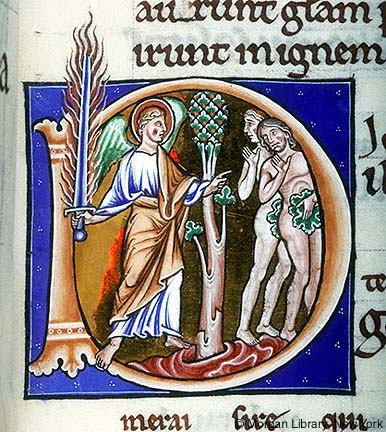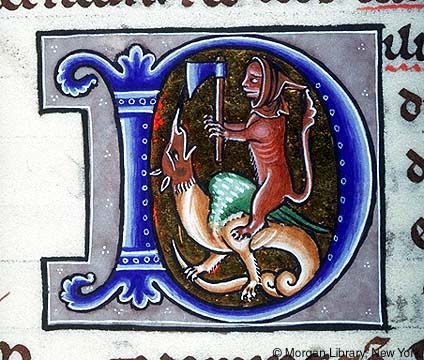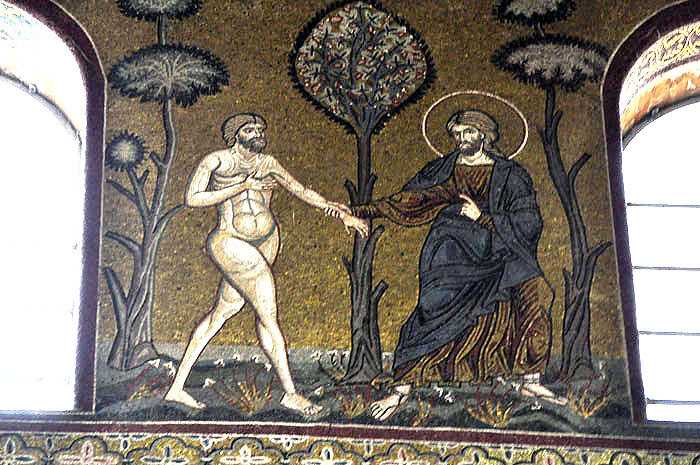Augustine’s Literal Interpretation of Genesis
This blog, “A Traveling Theology” has a fundamentally optimistic view of life on Earth. Our time here as sojourners is a difficult adventure, where we are tourists in a strange place. Through the process of experiencing creation, both the good things about life and the bad, we come to know God. Many thinkers throughout Christian history have tackled the question of why we are alive. Why are we born in this world? Why does suffering exist? What is the point of our time here?
Today I will take a bite out of one Christian response to this: Augustine’s reading of Genesis 2:15 in his Literal Interpretation of Genesis. Now, anyone familiar with the African theologian Augustine knows that his theology is intricate. This post highlights Augustine’s analysis of one verse – it is not an exhaustive presentation of Augustine’s ideas about life on Earth.
In the NRSV, Genesis 2:15 reads “The Lord God took the man and put him in the garden of Eden to till it and keep it,” but Augustine has a slightly different version. He says:
| Taylor Translation pg 47 | PL De Genesi ad litteram VIII.10.19[i] |
| But But if we take care to translate literally from the Greek, the text says , and the Lord God took the man whom He made and place him in Paradise to cultivate and guard X [3ms pronoun, i.e. it or him]. | Quanquam si de graeco diligentius ad verbum exprimatur, ita scriptum est, Et accepit Dominus Deus hominem quem fecit, et posuit eum in paradiso operari eum et custodire. |
Man, then, was to guard “it”. But what, Augustine wants to know, is man suppose to guard (protect, preserve) and cultivate? Is it Paradise man is supposed to guard, and if so, why? Or is there something in paradise man is supposed to guard? What threats could there have possibly been, since “beasts were surely not a threat to man until he had sinned”?[ii] Augustine considers three solutions:
- Man is to guard himself, keeping God’s commands and to cultivate discipline in agriculture
- Man is to guard paradise for himself, i.e. keep God’s commands so he is not expelled
- It is not man but God who is the cultivator – the subject in Latin could as well be God (from the previous clause) as man. Then à God placed man in the garden so that God might cultivate man.
Augustine prefers that last explanation, saying “for just as man cultivates the earth not to make it earth but to develop it and make it fruitful, so God in a much deeper sense cultivates man, whom He has created and made man, so that he may be made just if he does not turn away from his Creator by pride.”[iii] God cultivates man, who is already man, that he “may be devout and wise, and to guard him because when he takes more delight in the power he has in himself than in that of God, who is above him, and when he condemns the authority of God, man cannot be safe.”[iv]

fol. 54r
In short, while he acknowledges other possibilities, Augustine reads Genesis 2:15 as about how God cultivates and guards humanity.
One of the great issues we face in the Christian tradition is the why question – why did God make humanity, and make us the way we are, knowing we would sin? Why set us up, knowing we would fail? Augustine’s response is less a moral one, and more an aesthetic one: that there is something beautiful, that only God can see, in all this muck. Here, Augustine gives us an image of God placing us in the garden to cultivate us and to guard us – in a garden that Adam could not, on his own accord, have kept serpent-free.
Still, there is another question: Why did God make God’s work with the intention of cultivation, rather than completed? In Augustine’s analysis, humanity was always mutable. Augustine says “now, if the original works of God, when He created all things simultaneously, were not perfect according to the limit of their nature, no doubt there would later be added the perfections needed to complete their beings; and thus the perfection of all the world is made up of what we might call two halves.”[v] In essence, God’s work is already completed, and in another sense it is just begun as time unfolds and ages follow ages. The completion is in that “in their proper natures by which they fulfill their role in time they have nothing that was not present in them as made in its causes.”[vi] However, the work of creation has just begun because “in them are seeds, as it were, of future perfections to be put forth from their hidden state and made manifest during the ages at the appropriate time.”[vii]
It is not just humanity that God cultivates then, but all of creation and for Augustine there is something about this unfolding that God planned. God established the causes of all things, and later God would fulfill everything in the effects. Seeds are planted, gardens grow, and the growth is what would lack in a world fully completed.

fol. 54r
This brings us, at last, to the growth possible for us compared with Adam. Adam, Augustine says, was both mortal and immortal: mortal in the sense that “he was able to die, immortal because he was able to not die.”[viii] We do not have the same luxury, in fact Augustine asks “how could St. Paul refer to our body as dead, when he was talking about those still living?” [ix] The answer is that this is the case “in so far as the necessity of dying is inherent in our race from the sin of first parent.”[x] We have to die (or are already dead?), even if we live a holy life.
Hope, for us, comes in the form of cultivation – what God was already doing in the garden of Eden, God continues. Not everything that was lost will be restored, as death will come but the image of God is impressed upon us through cultivation. “It was this image, impressed on the spirit of our minds, that Adam lost by his sin; it is this that we regain through the grace of justice, not a spiritual and immortal body which had had not yet received, but which all the saints will have at the resurrection.”[xi] It was this spiritual body that is “the rewards of the merit which Adam lost” which is still open to us.[xii]
Thus far, we have considered how Augustine frames God as the cultivator in the garden and specifically how this cultivation relates to the unfolding Augustine sees in the plan for creation. Because of the Fall, Augustine sees death as inevitable where it was only one possible road before for humanity. However, the cultivation and the growth, as well as presumably the guarding, continue. Though we are dead, i.e. our bodies will inevitably die, the rewards of merit are open to us. God, the great cultivator, continues and can raise us to heights that Adam in his bliss did not experience. The seeds were planted in humanity before time unfolded, the principles of motion were nudged to life. The outlook, I think, is primarily hopeful: the apostles “without doubt also had natural bodies, but interiority they lived a spiritual life, renewed as they were in the knowledge of God after the image of their Creator.”[xiii] Sin and death are inevitable, but the same God who planted the seeds in the garden will guard and cultivate humanity until the fullness of time.
What is our life on Earth, then? The time in which we are cultivated by God and grow.

[i] Cf. Septuagint καὶ ἔλαβεν κύριος ὁ θεὸς τὸν ἄνθρωπον ὃν ἔπλασεν καὶ ἔθετο αὐτὸν ἐν τῷ παραδείσῳ ἐργάζεσθαι αὐτὸν καὶ φυλάσσειν. This is similar to the Vulgate Tulit ergo Dominus Deus hominem, et posuit eum in paradiso voluptatis, ut operaretur, et custodiret illum. Jerome in his Hebrew Questions on Genesis (Hayward translation) explains further about this translation “And the Lord took up the man, and placed him in the paradise of pleasure. In the Hebrew it has ‘Eden’ instead of pleasure. Now the Septuagint themselves explained Eden as meaning ‘pleasure’; but Symmachus, who a little earlier had translated it as ‘flowering paradise’, put here en toi paradeisoi tes aktes, which itself has overtones of both ‘charm’ and ‘delights’.”
[ii] De Genesi ad litteram VIII.10.21, Taylor
[iii] De Genesi ad litteram VIII.10.23, Taylor
[iv] De Genesi ad litteram VIII.10.23, Taylor
[v] De Genesi ad litteram VI.11.18, Taylor
[vi] De Genesi ad litteram VI.11.18, Taylor
[vii] De Genesi ad litteram VI.11.18, Taylor
[viii] De Genesi ad litteram VI.25.37, Taylor
[ix] De Genesi ad litteram VI.26.37, Taylor
[x] De Genesi ad litteram VI.26.37, Taylor
[xi] De Genesi ad litteram VI.27.38 Taylor
[xii] De Genesi ad litteram VI.27.38 Taylor
[xiii] De Genesi ad litteram VI.28.39 Taylor
Leave a Reply